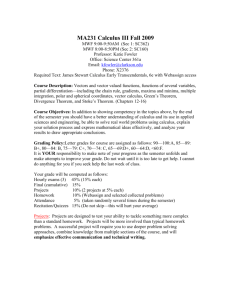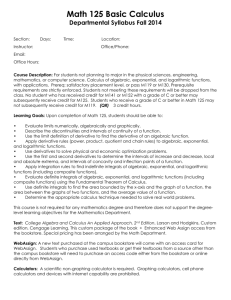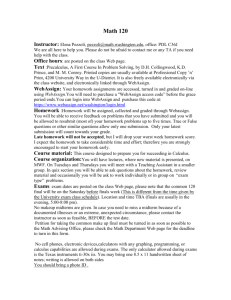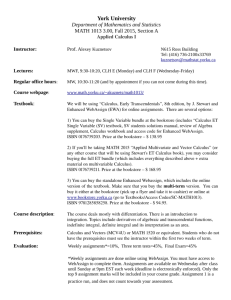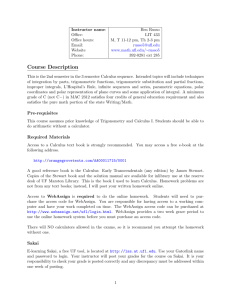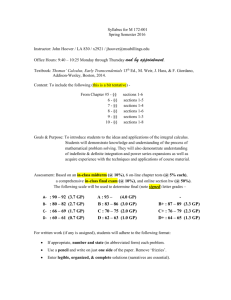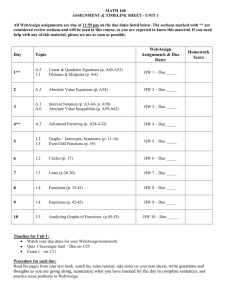Math 221 – Calculus I – Fall 2013
advertisement
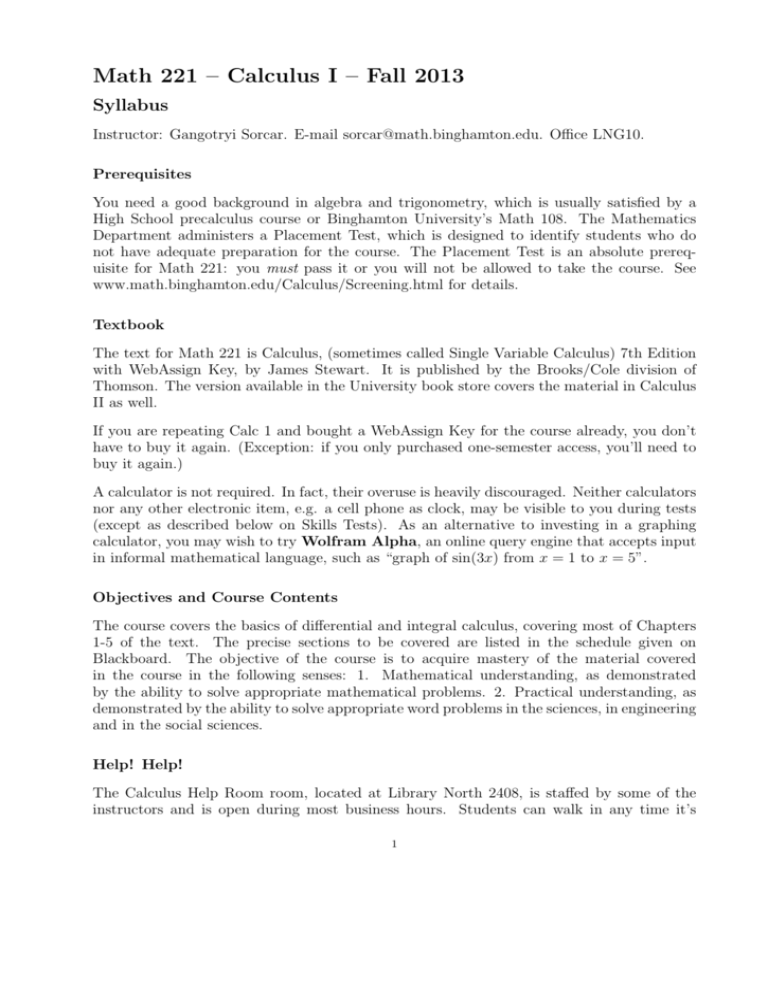
Math 221 – Calculus I – Fall 2013 Syllabus Instructor: Gangotryi Sorcar. E-mail sorcar@math.binghamton.edu. Office LNG10. Prerequisites You need a good background in algebra and trigonometry, which is usually satisfied by a High School precalculus course or Binghamton University’s Math 108. The Mathematics Department administers a Placement Test, which is designed to identify students who do not have adequate preparation for the course. The Placement Test is an absolute prerequisite for Math 221: you must pass it or you will not be allowed to take the course. See www.math.binghamton.edu/Calculus/Screening.html for details. Textbook The text for Math 221 is Calculus, (sometimes called Single Variable Calculus) 7th Edition with WebAssign Key, by James Stewart. It is published by the Brooks/Cole division of Thomson. The version available in the University book store covers the material in Calculus II as well. If you are repeating Calc 1 and bought a WebAssign Key for the course already, you don’t have to buy it again. (Exception: if you only purchased one-semester access, you’ll need to buy it again.) A calculator is not required. In fact, their overuse is heavily discouraged. Neither calculators nor any other electronic item, e.g. a cell phone as clock, may be visible to you during tests (except as described below on Skills Tests). As an alternative to investing in a graphing calculator, you may wish to try Wolfram Alpha, an online query engine that accepts input in informal mathematical language, such as “graph of sin(3x) from x = 1 to x = 5”. Objectives and Course Contents The course covers the basics of differential and integral calculus, covering most of Chapters 1-5 of the text. The precise sections to be covered are listed in the schedule given on Blackboard. The objective of the course is to acquire mastery of the material covered in the course in the following senses: 1. Mathematical understanding, as demonstrated by the ability to solve appropriate mathematical problems. 2. Practical understanding, as demonstrated by the ability to solve appropriate word problems in the sciences, in engineering and in the social sciences. Help! Help! The Calculus Help Room room, located at Library North 2408, is staffed by some of the instructors and is open during most business hours. Students can walk in any time it’s 1 staffed and can ask questions of any of the instructors there, not just their own instructor. The Help Room schedule will be posted on Blackboard. The Discovery Program has tutors for various subjects. See the link on Blackboard for more information. Exams and Grading The class will have three types of test: Skills Tests will cover basic computations that you absolutely must be able to do for any class that has Math 221 as a prerequisite. Because these skills are so important, you are required to pass each of the four Skills Tests with a 70% or higher in order to pass the class. These tests are administered by computer, with no partial credit, and you may take each test up to three times. (More details on this below.) You can find a Practice Test for each Skills Test, with a large pool of practice problems, on WebAssign. Midterm tests will cover higher-level problems. These are paper tests, graded by your instructor, and you will not be allowed to re-take these. They will not include any of the sort of basic computational problems covered by the skills test, although of course you may be required to do some basic computations as part of a bigger problem. If you are in an 8:00 section, then your midterm will be in class. All sections at other times will have midterms in the evening. Time and place will be posted on Blackboard. Finally, there will he a final exam, which will contain both basic computations and more sophisticated problems similar to those on the in-class tests. Like the in-class tests, this will be on paper, and you will not be allowed re-takes. See the Blackboard section “test review materials” for practice in-class tests and a practice final. Once again, you must pass all the Skills Tests in order to pass the class. In addition, each Skills Test counts for 7% of your final grade. The two in-class tests will each count for 15% of your final grade. The final exam will count for 30% of your final grade. Precalculus Review homework will count for 1% of your final grade, and calculus homework will count for 5% of your final grade. Weekly quizzes will count for the remaining 6%. Homework Using WebAssign For each section of material covered there will be an assignment of problems from the textbook. We will be using the WebAssign system for homework and for the Skills Tests. It is important that you buy the version of the textbook with WebAssign key: otherwise your homework will not be graded and you will not be able to take the Skills Tests. WebAssign is an online question answering program that comes with an e-book. Your instructor will be able to schedule assignments for you to complete online, and it will guide you and grade your answers. You will be given instructions on how to use WebAssign by your instructor. 2 Study groups are encouraged, but students should not become dependent on others too much. Watching the instructor, or other students, do the problems will not be enough to learn the material. It will be necessary for you to do many exercises yourself in order to be successful on the exams. Attempts to solve homework problems provide the best way to learn the material and to prepare for exams. Precalc Review Homework On most Fridays there will be a short homework due reviewing the Precalc material most important to the coming week. If your precalc skills are fresh, these assignments should be fast and easy. They are on Webwork, which is similar to Webassign. If you score at least 80% on this assignment, then you get full credit for that week’s Precalc Review. If you get below 80%, then you will need to review the material and complete a more indepth followup assignment on the same material due the following Tuesday. We will point you to online review material sources, and the Discovery Program will have weekend help sessions to help you review as well. If you get at least 80% on the followup assignment, then you get full credit for that week’s Precalc Review. If you get below 80% on both the original assignment and the followup, then you get no credit for that week’s Precalc Review. If you get above 80% on the original assignment, you’re still welcome to use the review resources and do the followup assignment for extra practice, but it will not affect your grade. More on the Skills Tests The Skills Tests will be administered by computer in Room LNG 332. They use the same software as the WebAssign homework. Thus, you must have a WebAssign key before you take the tests. For security reasons, you must use the computers provided. You are not assigned a particular time to take the test – you will reserve times for your tests at the link provided in Blackboard. For each test, you have a window of about 3 weeks to pass, and you may take the test up to 3 times (once during each week it’s available). See the weekly schedule for the time windows for each test. The computers are equipped with a very basic calculator to do arithmetic calculations. No other electronic devices are allowed. The grading is as follows: a score of 90-100 is an A, a score of 80-89 is a B, a score of 70-79 is a C, and any score below 70 is failing. Remember, you must get a passing grade on each Skills Test in order to pass the class. Only the letter grade will matter in calculating your grade for the course, and only your highest score on each skills test is counted. Example 1. Student X scores a 90 on her first try at Skills Test 1. Thus, she has an A, the highest possible score, so she has no reason to re-take the test. 3 Example 2. Student Y scores an 80 on her first try at Skills Test 2. She decides to try and improve this, but on her second try she gets a 68, and on her third try she gets a 75. Since her highest score on Skills Test 2 was an 80, she gets a B. As noted previously, each Skills Test counts for 7% of your course grade. Numerically, an A will count as 100%, a B will count as 89%, and a C will count as 79%. (Remember that you need at least a C on each Skills Test in order to pass the class.) You may only schedule one Skills Test session per week. If your schedule is tight then you should reserve your times well in advance. You can always change the reservation later, if space in another session is available. It is essential that you show up for your test appointments! If you decide not to take a test you’ve scheduled, then you must cancel at least 3 hours in advance. The testing room is filled to capacity at popular times, and if you make an appointment and then fail to show then you’re keeping someone else out. If you don’t show up for a test you’ve scheduled, you will NOT be able to schedule another time that week, and 3 points will be deducted from your highest score for that Skills Test. (For instance, if your highest grade was an A, then it will count as 97%, not 100%.) You must have an appointment in order to take a test – no drop-ins will be accepted. Appointments can be made until immediately before the test time. However, popular test times tend to fill up well in advance, and you are strongly encouraged to reserve test times as soon as you know that you’ll need them. (For instance, schedule your first try at each test at the start of the semester.) If you need an exception to any of the Skills Test rules above (for instance, an extension due to illness), speak to your instructor in advance. All exceptions are at the discretion of your instructor. The point of the Skills Tests is to keep you on track on the most essential material, and to save you from digging yourself into a hole too deep to get out of. The questions on the Skills Test are, for the most part, much more basic than the questions on the paper tests, and they cover material you need to master in order to keep up with the class. So, you should always take the first possible try at each Skills Test. If you get an A on your first try, then you should feel good that you have a solid foundation for studying the more sophisticated material, and you should charge ahead. If you don’t get a grade you’re happy with on your first try, this should set off alarm bells! It’s time to drop everything and focus on getting the basics! Look at what gave you trouble on the test, and use the Practice Skills Tests, the Help Room, and your instructor to get your difficulties worked out. You might also contact the Discovery Program for tutoring or other academic support. Make-ups Make-up exams for the in-class tests will only be given for serious, documented reasons, and all make-ups must be approved by your instructor before the test date. 4 IF YOU HAVE A CONFLICT WITH THE MIDTERMS OR FINAL EXAM, YOU SHOULD TELL YOUR INSTRUCTOR ABOUT IT AT THE START OF THE SEMESTER. Academic honesty You are reminded of Binghamton University’s Student Academic Honesty Code (see link on Blackboard). Cheating on tests or quizzes will be dealt with severely and can result in suspension from the University for multiple semesters. Don’t even think about it. In-class exams will be returned after they are graded, and an answer key will be available. If you do not understand your mistakes, or you think your exam was not correctly graded, you should immediately bring the test to your instructor for re-evaluation. DO NOT MAKE ANY CHANGES OR WRITE NEW MATERIAL ON YOUR GRADED EXAM!! Turning in a modified exam for extra points is CHEATING. Instructors may be making copies of exams before they are returned, so if a student changes a graded exam, it will be clearly shown by comparison with the copy. Any cases of cheating will be subject to investigation by the Academic Honesty Committee of Harpur College. General Comments Regular class attendance is important for success in this course. Even if you’ve taken a previous Calculus course, this course is likely to be taught from a more sophisticated perspective, and if you think this class will be review you’re probably mistaken. If you do have to miss a small number of classes, you are responsible for finding out what was covered and being aware of any announcements that were made. You should expect to spend two hours studying outside of class for every hour spent in class. In contrast to most high school math classes, if you don’t understand the material being covered, you should NOT assume that your instructor will repeat the material until you get it. Ideally, you should ask questions at the time in class. Of course, you’ll also probably need to spend time thinking things through on your own, but if you’ve tried that and are still confused, make use of the Help Room and office hours. Don’t wait! The material in this course is very cumulative, so anything you don’t understand now is likely to keep giving you trouble as the semester goes on. The coordinator for the course is Prof. Laura Anderson, laura@math.binghamton.edu. She is not an instructor for the course. Barring exceptional circumstances, queries about the course should be directed to your instructor, not to Prof. Anderson. Obscure statement NY State requires us to include on this page: Students in M courses will demonstrate competence in an area such as calculus, symbolic logic, the logic of computers, the logic of deductive and inductive reasoning, or probability and statistical inference. 5
